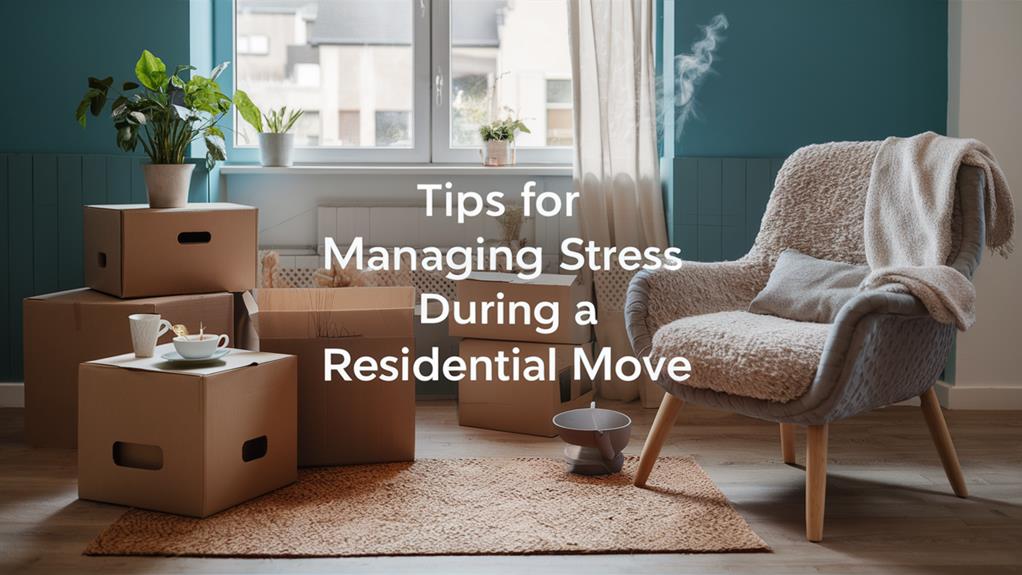Managing stress during a residential move can feel overwhelming, but you can use several strategies to make it easier. Start by packing at least two months in advance and create a detailed checklist. It's also helpful to set a budget to keep expenses in check. On moving day, keep essential items close and take regular breaks to recharge. After the move, unpack systematically and establish new routines to feel more settled. If you notice lingering stress or emotional difficulties, it may be time to consider professional support to help you adjust. There's more to explore about managing moving stress effectively.
Understanding Moving Stress

Moving can bring a whirlwind of stress that often feels overwhelming. It's no surprise that moving stress is frequently rated as one of the most stressful life events. According to a 2020 survey, 45% of people find it more stressful than divorce or job loss.
The emotional stress of moving can lead to anxiety, irritability, and even feelings of worthlessness. Physically, you might experience fatigue, headaches, or chest pain. To alleviate some of this stress, consider implementing an organized approach with early early planning and decluttering, which can help streamline the moving process.
Common stress triggers during packing and moving include changes in location, financial strains, and the fear of the unknown. These factors can complicate your emotional landscape, making it hard to focus on the relocation process.
About 30% of individuals face significant stress during moves, which can negatively impact relationships and work productivity.
To manage the stress, it's important to recognize your stress triggers. Developing effective coping strategies can help you navigate the challenges of moving.
Consider creating a checklist to break down tasks, setting a budget to address financial strains, and allowing time for breaks to ease the emotional stress. By understanding moving stress and its effects, you'll be better prepared to handle the transition smoothly.
Effective Pre-Move Strategies
Planning ahead can significantly reduce stress during a move. Start packing at least 2-3 months in advance. This gives you plenty of time to sort through your belongings, helping you avoid the last-minute chaos that often leads to stress.
A detailed moving checklist is a fantastic tool; it breaks down your tasks into manageable steps, so you can track your progress and stay organized. Additionally, establishing a detailed budget can alleviate financial stress and help you stay on track with your expenses.
One of the best tips for reducing stress is to declutter your home. Create three piles: keep, donate, and discard. This not only lightens your moving load but also promotes mental clarity.
Remember to gather all your important documents early, so you don't scramble to find them later. Familiarizing yourself with your new neighborhood can also ease anxiety. Research local services, schools, and amenities to help you feel more at home before you even arrive.
Lastly, don't forget to allocate time for goodbyes with friends and familiar places; this provides emotional closure and supports your mental well-being during the transition. With these effective pre-move strategies, you'll find that moving can be a much smoother experience.
Tips for Moving Day

On moving day, having a clear checklist is crucial for a smooth process. Start by making a list of tasks you need to complete, which will help reduce stress as you transition to your new home. Additionally, consider utilizing comprehensive services offered by professional movers, such as efficient packing and unpacking services.
Keep essential items, like important documents, medications, and a change of clothes, easily accessible. This way, you won't waste time searching for them amid the chaos.
Consider hiring professional movers to share the workload. They can assist with heavy lifting and logistics, allowing you to manage moving more efficiently.
Don't forget to schedule regular breaks throughout the day to maintain your energy levels. Taking short pauses prevents burnout and keeps you focused and positive.
As you navigate the day, stay flexible and prepared for unexpected challenges, like delays or last-minute changes. A positive mindset will help you adapt and respond calmly to whatever comes your way.
Post-Move Adjustment Techniques
Adjusting to a new home can feel overwhelming, but implementing effective post-move techniques can ease the transition. Start by unpacking systematically, focusing first on essential items. This creates a sense of order and helps reduce feelings of overwhelm.
Establishing routines is crucial; incorporating familiar activities fosters stability as you acclimate to your new environment.
Take time to explore your neighborhood. Familiarizing yourself with local parks, shops, and community groups enhances your sense of belonging and reduces feelings of isolation. Connecting with others can alleviate loneliness during this adjustment period.
Don't forget about self-care. Engaging in activities like exercise or relaxation techniques is vital for stress management and promoting mental well-being.
When to Seek Professional Help

Moving can stir up a whirlwind of emotions, and it's important to recognize when those feelings might signal a need for professional help. If you find that stress and anxiety linger beyond the initial excitement of moving, it might indicate moving-related depression.
Emotional fluctuations, such as persistent sadness or irritability, can also suggest that seeking therapy could be beneficial.
Watch for physical symptoms like headaches, fatigue, or chest pain that don't seem to improve. These can be signs that your stress levels are too high and need professional intervention.
If you're struggling to maintain daily routines or complete your responsibilities due to moving stress, a therapist can offer valuable coping strategies to help you manage.
For families, particularly children, emotional fluctuations can be challenging during this transition. Professional counseling can aid in better adjustment and emotional processing.
Additionally, if feelings of nostalgia and loss lead to social withdrawal or avoidance of new experiences, therapy can assist you in navigating these complex emotions, helping you build resilience.
Recognizing when to seek professional help is a key step in ensuring a smoother transition during your move.
Conclusion
Moving can be stressful, but with the right strategies, you can manage that stress effectively. By preparing in advance, staying organized on moving day, and giving yourself time to adjust afterward, you can make the process smoother. Remember, it's okay to seek help if you're feeling overwhelmed. Keeping these tips in mind will help you navigate your move with confidence, allowing you to settle into your new home and enjoy this new chapter in your life.
